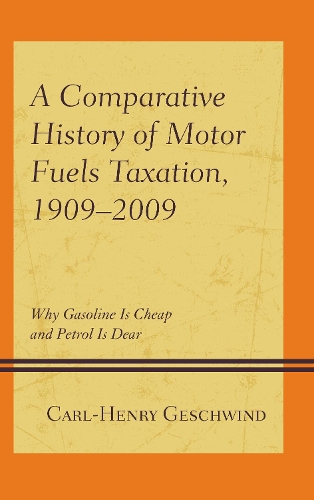
A Comparative History of Motor Fuels Taxation, 19092009: Why Gasoline Is Cheap and Petrol Is Dear
(Hardback)
Publishing Details
A Comparative History of Motor Fuels Taxation, 19092009: Why Gasoline Is Cheap and Petrol Is Dear
By (Author) Carl-Henry Geschwind
Bloomsbury Publishing PLC
Lexington Books
9th May 2017
United States
Classifications
Professional and Scholarly
Non Fiction
Economic history
Economics
European history
History of the Americas
336.2786655
Physical Properties
Hardback
256
Width 157mm, Height 239mm, Spine 25mm
562g
Description
Slowing down global warming is one of the most critical problems facing the worlds policymakers today. One favored solution is to regulate carbon consumption through taxation, including the taxation of gasoline. Yet gasoline tax levels are much lower in the United States than elsewhere. Why is this so, and what does it tell us about the prospects for taxing carbon here A Comparative History of Motor Fuels Taxation, 19092009: Why Gasoline Is Cheap and Petrol Is Dear examines these questions by tracing the evolution of gasoline tax policies in the United States, Germany, the United Kingdom, and New Zealand since the early twentieth century. In the process, it highlights the crucial role played by fiscal crises.
Reviews
If you want to understand the politics of climate change in our time, you need to understand the politics of fiscal crisis in the twentieth century. Carl-Henry Geschwinds masterful comparative history shows how decisions made long ago still constrain our ability to tax gasoline. This is an important and urgently-needed book. -- Isaac William Martin, University of California, San Diego
Anyone who cares about the environment must wonder why gasoline taxes are so much lower in the United States than in other countries, and anyone trying to answer that question must eventually read this book. Carl-Henry Geschwind's extraordinary comparative historical analysis does more than answer the questionit also suggests possibilities for change, and where and exactly why to expect resistance. It is a remarkable demonstration of how historically oriented social science can shed light on the problems of our present and the possibilities for our future. -- Monica Prasad, Northwestern University
This book is one of the very best comparative studies we have on the international history of taxation. Carl-Henry Geschwind brilliantly uses the history of gasoline taxation to reflect on fundamental issues of political economy. Consequently, the book is certain to stimulate a new wave of scholarship on the comparative history of consumption taxation. The book should become required reading for all scholars and policymakers interested in the political and economic interaction of consumption and income taxation. -- W. Elliot Brownlee, University of California, Santa Barbara
In this study, Carl-Henry Geschwind provides a convincing and much-needed historical analysis of gasoline taxes around the world. Exhaustively researched and compellingly argued, Geschwinds book challenges conventional wisdom about why American gas taxes are so low relative to those in other countries. Anyone interested in transportation, environmental, or fiscal policy should read this book. -- Molly Michelmore, Washington and Lee University
Author Bio
Carl-Henry Geschwind holds a PhD in the history of science from Johns Hopkins University.
